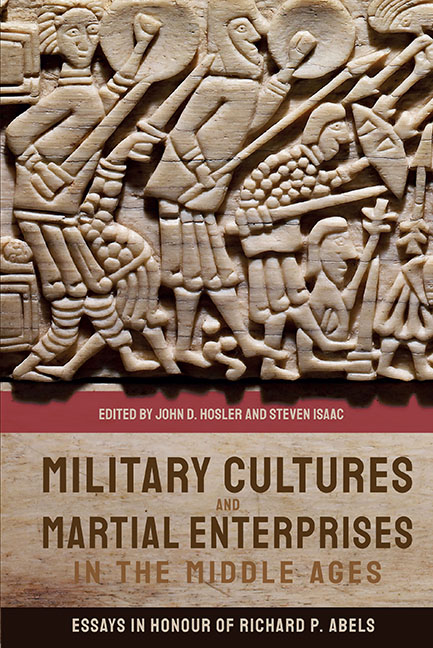Book contents
- Frontmatter
- Contents
- List of Illustrations
- Notes on Contributors
- Introduction and Appreciation
- 1 Charlemagne’s Invasion of Spain in 778: The Anatomy of a Strategic Failure and its Impact
- 2 Military Intelligence and Strategic Planning Under the Ottonian Kings of Germany, 919–1024
- 3 Ain’t Nobody Here But Us Chickens: Defeated Warriors, Masculinity, and Mistaken Identity in Western Europe, 679–1141
- 4 Count Baldwin V of Flanders: Broker of Eleventh-Century Power
- 5 Kings and Fortuna: The Meanings of Brémule
- 6 Fighting the Last War: Remembering the Norman Conquest during the Anarchy
- 7 Gilbert of Mons’ Chronicle of Hainaut as a Source for Military History in the Twelfth Century
- 8 At Home with Roger of Howden
- 9 Embedded Reporters? Ambroise, Richard de Templo, and Roger of Howden on the Third Crusade
- 10 The Treatment of Male and Female Prisoners of War during the Third Crusade
- 11 Exempla, Crusade, and Chivalry
- 12 Frontier Warfare in the St Omer Chronicle
- 13 Some Observations on the Training of Medieval Warhorses
- Richard P. Abels’ Curriculum Vitae
- Index
- Tabula Gratulatoria
7 - Gilbert of Mons’ Chronicle of Hainaut as a Source for Military History in the Twelfth Century
Published online by Cambridge University Press: 21 October 2020
- Frontmatter
- Contents
- List of Illustrations
- Notes on Contributors
- Introduction and Appreciation
- 1 Charlemagne’s Invasion of Spain in 778: The Anatomy of a Strategic Failure and its Impact
- 2 Military Intelligence and Strategic Planning Under the Ottonian Kings of Germany, 919–1024
- 3 Ain’t Nobody Here But Us Chickens: Defeated Warriors, Masculinity, and Mistaken Identity in Western Europe, 679–1141
- 4 Count Baldwin V of Flanders: Broker of Eleventh-Century Power
- 5 Kings and Fortuna: The Meanings of Brémule
- 6 Fighting the Last War: Remembering the Norman Conquest during the Anarchy
- 7 Gilbert of Mons’ Chronicle of Hainaut as a Source for Military History in the Twelfth Century
- 8 At Home with Roger of Howden
- 9 Embedded Reporters? Ambroise, Richard de Templo, and Roger of Howden on the Third Crusade
- 10 The Treatment of Male and Female Prisoners of War during the Third Crusade
- 11 Exempla, Crusade, and Chivalry
- 12 Frontier Warfare in the St Omer Chronicle
- 13 Some Observations on the Training of Medieval Warhorses
- Richard P. Abels’ Curriculum Vitae
- Index
- Tabula Gratulatoria
Summary
GILBERT'S CHRONICLE COVERS the history of the county of Hainaut from 1071, when it came under the rule of an ousted branch of the house of Flanders, to 1196. By 1169 Gilbert was a chaplain at the court of Baldwin IV, count of Hainaut (1120–71), then court chaplain to Count Baldwin V (1171–95), whose chancellor he became by 1178. He held many offices under Baldwin V but none under Baldwin VI, count of Flanders and Hainaut (1195–1205). Gilbert served as an envoy to the court of the Emperor Frederick Barbarossa (1152–89) and his son Henry at least eight times, and on one occasion acted as a judge at the request of the emperor. He also mentions that he acted as an envoy to the count of Champagne. He was familiar with neighboring powers England and France. As a cleric he was richly rewarded with ecclesiastical offices, being especially devoted to the abbey of St Waudru of Mons of which he was Provost. Gilbert wrote his work in the years 1195–96 and had access to documents and memories of the past. His narrative before the late 1160s is uneven especially on military matters. Thus we are told Baldwin IV and his wife resisted “continual assaults of war” from Thierry of Flanders with no details. But he is often very detailed for the same and even more remote periods on matters that would have been in his records, like noble inheritances. Gilbert's work is invaluable for the prosopography of the Low Countries and is notably useful for identifying noble women though he is occasionally inaccurate. As a cleric deeply enmeshed in court affairs and diplomacy, he is comparable to Roger of Howden, whose chronicle is also very useful for the study of warfare.
The work must be understood in the context in which it was written. Hainaut was one of a group of small powers sandwiched between the county of Flanders, the German Empire and the kingdom of France. The dukes of Brabant, the counts of Namur, the counts of Looz, the counts of Guelders, the counts of Vermandois, of Holland and of Champagne all had family and tenurial connections.
- Type
- Chapter
- Information
- Military Cultures and Martial Enterprises in the Middle AgesEssays in Honour of Richard P. Abels, pp. 136 - 155Publisher: Boydell & BrewerPrint publication year: 2020



